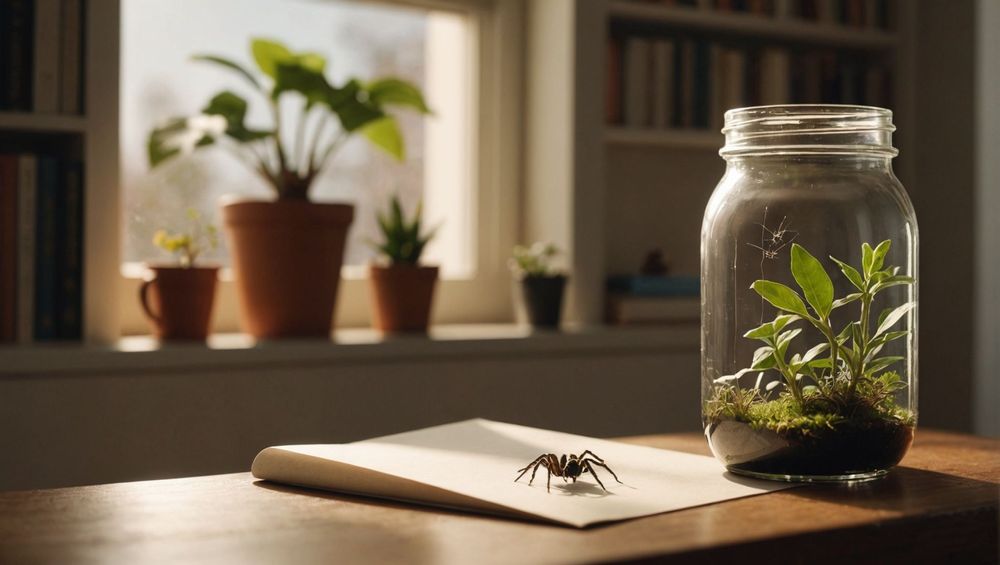If you’re wondering how to keep spiders out of your house without resorting to harmful chemicals, you’re not alone. Many homeowners prefer to use humane and natural methods to deter these eight-legged guests. In this article, we will explore effective techniques to keep spiders at bay, all while ensuring that your home remains a safe haven for both you and the environment.
Understanding Why Spiders Invade Your Home

Before diving into prevention methods, it’s essential to understand why spiders might choose to enter your home. Spiders often seek shelter indoors for various reasons:
- Food Sources: Spiders are natural predators that feed on insects. If your home has an abundance of flies, mosquitoes, or other insects, it may attract spiders.
- Safe Haven: Like any creature, spiders are looking for a safe and secure environment to live and breed, particularly when harsh weather conditions prevail outside.
- Hiding Spots: Cluttered areas, dark corners, and stacks of paper or boxes provide excellent hiding spots for spiders.
Understanding these reasons can help you take appropriate preventive measures to keep them away effectively.
Effective Natural Deterrents

Implementing natural deterrents is one of the most effective ways to keep spiders out of your house while maintaining an eco-friendly environment. Here are some common household items you can use:
- Essential Oils: Spiders are known to dislike the smells of certain essential oils, such as peppermint, tea tree, lavender, and citrus. Mixing water with a few drops of these oils in a spray bottle and applying it around entry points can deter spiders.
- Vinegar: White vinegar is another potent spider repellent. Creating a 50/50 mixture of vinegar and water and spraying it around your home can help keep spiders away.
- Citrus Peels: Distributing citrus peels in areas where spiders are common can act as a natural repellent. Spiders tend to avoid citrus scents.
Incorporating these natural deterrents into your cleaning routine can help create a less inviting atmosphere for spiders.
Creating an Uninviting Environment
Besides using natural repellents, modifying your home environment is crucial in keeping spiders out:
- Declutter: Keeping your space organized reduces the number of hiding spots for spiders. Regularly clean and declutter your home, especially in attics and basements.
- Seal Cracks and Gaps: Inspect windows, doors, and walls for any cracks or gaps that might allow spiders to enter. Use caulk or weather stripping to seal these openings effectively.
- Maintain Indoor and Outdoor Cleanliness: Regular cleaning, both inside and outside your home, discourages insects and, consequently, spiders from making your home their habitat.
- Garden Maintenance: If you have a garden, keeping plants trimmed and removing debris can prevent spiders from getting too close to your home.
Creating an uninviting environment can significantly reduce the likelihood of spider encounters.
Using Traps and Catch-and-Release Methods
If you find a spider in your home, consider using gentle traps instead of killing them. Catch-and-release methods allow you to remove spiders humanely:
- Jar Method: Use a glass jar and a piece of paper. Gently trap the spider with the jar, then slide the paper underneath. Take the spider outside and release it, ideally away from your home.
- Sticky Traps: Some sticky traps are designed specifically for spiders. Place these traps in corners or areas where you’ve seen spider activity, and then dispose of them as needed.
These techniques not only help manage your spider population but align with humane principles of pest control.
Conclusion
Keeping spiders out of your home doesn’t have to involve harmful chemicals or extermination methods. By understanding their motives, using natural repellents, creating an uninviting ambiance, and employing humane methods for dealing with any intrusions, you can maintain a spider-free home without compromising your values. Remember to keep your living space clean, use natural deterrents as needed, and ensure your home is well-sealed. Following these practices will help you enjoy a peaceful, spider-free environment.
FAQ
1. Are spiders harmful to humans?
Most spiders are harmless and can even be beneficial by controlling other pest populations. However, some species, like the black widow and brown recluse, can pose risks; it’s essential to be cautious.
2. Can I use bleach to deter spiders?
While bleach may kill spiders on contact, it is not an effective long-term repellent. It’s better to use natural methods for continuous prevention.
3. How often should I apply natural repellents?
It’s advisable to reapply natural repellents every few weeks, or after cleaning, to maintain their effectiveness against spiders.
4. Do certain plants help keep spiders away?
Yes, plants like lavender, mint, and citronella can deter spiders due to their strong scents. Placing these plants around your home can help.
5. Is it necessary to kill spiders I find inside my home?
No, you can safely remove spiders using humane methods, as spiders are essential for controlling pest populations. Consider capturing and releasing them instead.
